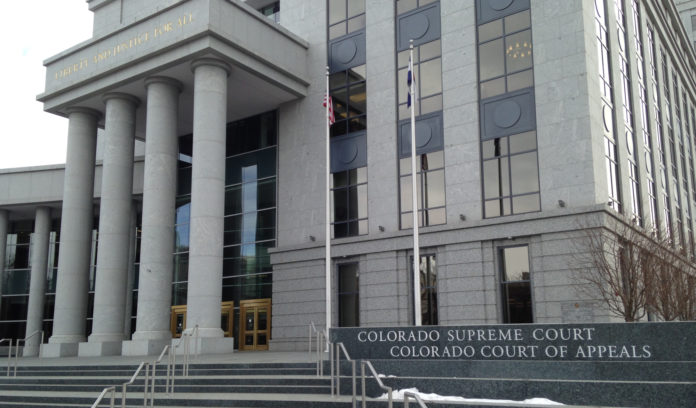

Editor’s Note: Law Week Colorado edits court opinion summaries for style and, when necessary, length.
Robert Kiesnowski first took the bench as a district court judge of the Adams County District Court in 2011. The instant matter involves Kiesnowski’s alleged misconduct and representation of his brother-in-law in 2023.
On May 31, 2023, Kiesnowski’s brother-in-law was involved in a domestic violence incident with his girlfriend and was admitted to intensive care for stab wounds he received during the conflict, according to the opinion. The following day an investigator with the district attorney’s office in the 13th Judicial District sought to interview his brother-in-law. But Kiesnowski’s wife denied the investigator’s interview request, indicating her brother was in too much pain to participate in an interview.
Later that day, Kiesnowski called the investigator on two separate occasions. During the first call, he disclosed he was a district court judge in the 17th Judicial District and relayed what his brother-in-law remembered from the incident. During the second call, he identified himself as Judge Kiesnowski. During that call, the investigator informed Kiesnowski he would let him know before he went to the hospital to interview his brother-in-law.
On June 2, 2023, the investigator went to the hospital to interview the brother-in-law without first informing Kiesnowski. The brother-in-law told the investigator he didn’t want to consent to an interview without first seeking advice from Kiesnowski, to whom he referred as his lawyer.
The investigator then called Kiesnowski, who responded he wanted to be present for the interview and could be at the hospital in approximately 40 minutes. Before leaving for the hospital, Kiesnowski reviewed the Colorado Code of Judicial Conduct Rule 3.10 to determine if it permitted him to represent his brother-in-law. Concluding it did permit this representation, he drove to the hospital to act as his brother-in-law’s legal counsel.
Once Kiesnowski arrived at the hospital, he consulted privately with his brother-in-law and then consented to a formal interview, which was video and audio recorded. Kiesnowski admitted in this judicial disciplinary proceeding he told the investigator he would be acting as his brother-in-law’s counsel and he requested his brother-in-law to wait for his instructions after each question. He further admitted he made statements during the interview, including calling the brother-in-law’s girlfriend a “total disaster” and accusing her of threatening to blame the brother-in-law for injuries she would inflict on herself.
He described his brother-in-law as a “hard-working guy” who had been hit by his girlfriend in the past. At the end of the interview, Kiesnowski signed a medical release for his brother-in-law, noting he was acting as a legal representative and provided his Colorado bar number on the release.
Ten days later, Kiesnowski retired from the bench pursuant to a condition of a stipulation for private censure he had agreed to for previous, unrelated judicial misconduct.
The commission filed the statement of charges at issue here on June 30, 2023. Kiesnowski responded to the charges, admitting to many of the facts but denying he had violated the code of judicial conduct. On Sept. 6, 2023, the special masters convened a one-day hearing and subsequently released the report on Sept. 22, 2023.
In the report, the special masters concluded Kiesnowski had committed the charged violations. They then recommended public censure. Thereafter, the commission adopted the report and recommended to the Colorado Supreme Court in October 2023 Kiesnowski be publicly censured and assessed costs.
In the recommendation, the commission included as an attachment the stipulation for private censure entered between the commission and Kiesnowski in the earlier, unrelated matter. Because that stipulation was entered pursuant to Colorado Rule of Judicial Discipline 35(h), and was intended to remain confidential, the Colorado Supreme Court struck the commission’s recommendation and attached record of proceedings. It simultaneously ordered the commission to submit an amended recommendation and a record of proceedings excluding or redacting the confidential materials and extra-record statements.
In response, the commission filed a motion to reconsider the Colorado Supreme Court’s order to redact from the record all information related to former Judge Kiesnowski’s prior disciplinary history. The motion for reconsideration argued the rules of judicial discipline permit disclosure of the details of Kiesnowski’s previous stipulation for private censure, and Kiesnowski waived his right to confidentiality as to his stipulation for private censure by not objecting to its admission into evidence and by committing new ethical breaches serious enough to warrant public discipline.
The Colorado Supreme Court granted the motion in part and denied it in part. Because Kiesnowski had not disputed the issue of waiver, the state Supreme Court declined to resolve any dispute over the interpretation of the rules of judicial discipline. Based on the waiver, the state Supreme Court allowed the commission to include the stipulation for private censure in the record of proceedings along with references to the facts underlying that stipulation. However, the part of the Colorado Supreme Court’s order requiring the redaction of the irrelevant and unproven assertions in paragraphs four through seven of the commission’s October 2023 recommendation remained unchanged.
The state Supreme Court ordered the commission to file an amended recommendation and record of proceedings.
The commission’s amended recommendation was submitted on Dec. 11, 2023. Kiesnowski timely filed exceptions to the commission’s amended recommendation.
The Colorado Supreme Court publicly censured Kiesnowski for his violations of Canon 1, Rule 1.1, Rule 1.2 and Rule 1.3, as well as Canon 3, Rule 3.10, of the Colorado Code of Judicial Conduct and ordered him to pay the costs incurred by the commission in this matter in the amount of $4,966.95.

